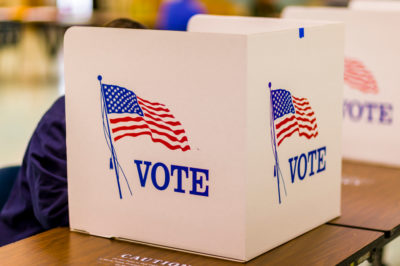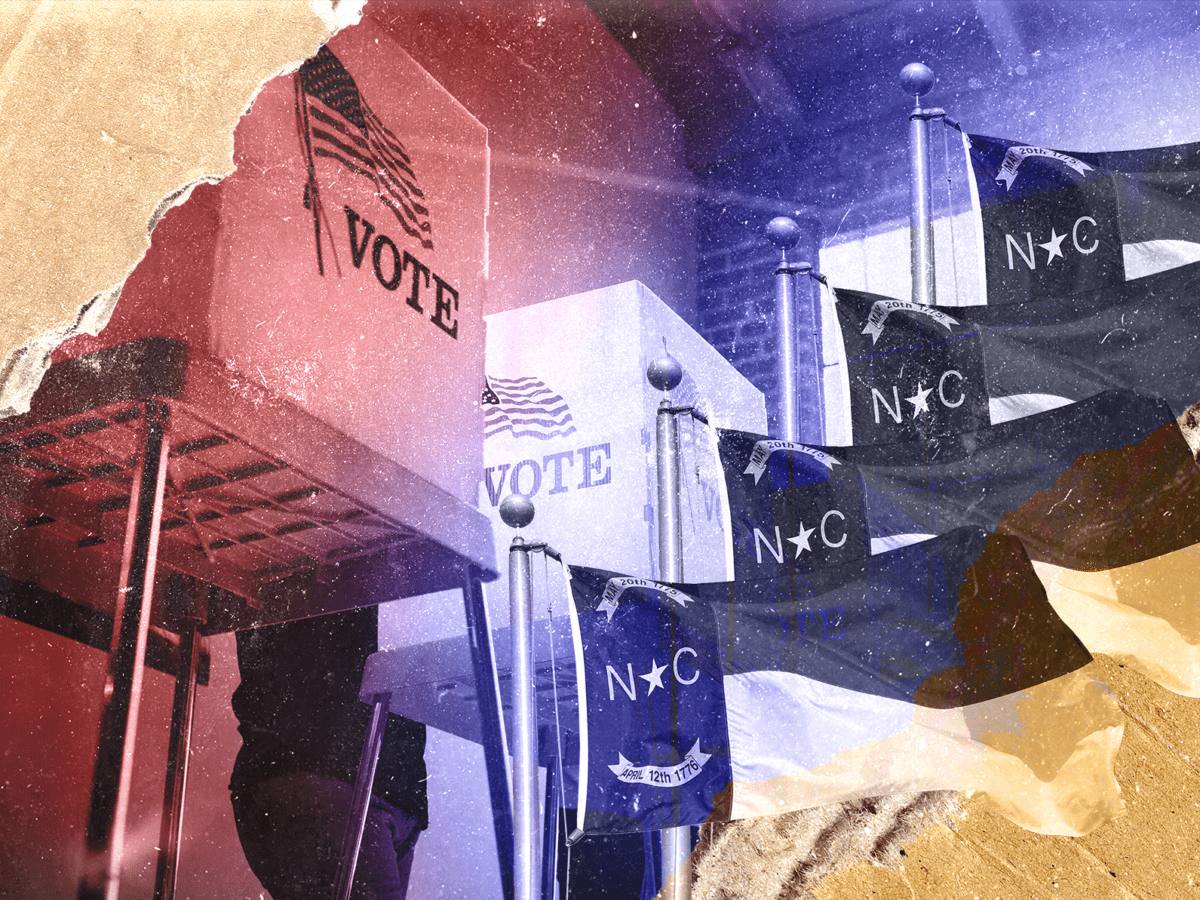
Update, Nov. 4 at 8 a.m. — This story was updated to include total early voting numbers.
Ahead of Election Day, more than 4.4 million people cast their ballots in North Carolina during early voting, according to data from the North Carolina State Board of Elections (NCSBE) at the close of polls on Nov. 2 — more than 56% of total eligible voters.
The state has outpaced the country in early voter turnout and is expected to play a big role in the presidential election. Across the country, many pundits are now looking to North Carolina as a key swing state in the presidential election between Republican Former President Donald Trump and Democratic Vice President Kamala Harris. Trump won the state over President Joe Biden in 2020 by 1.3%.
Project FiveThirtyEight, which aggregates polling data, shows Trump slightly ahead in the state, with a 48.4% polling average, and Harris at 47.1%.
“Of the seven swing states this year, North Carolina is the most puzzling,” a Brookings commentary says. “Because Trump is much more competitive in the national popular vote and in the swing states this year, he would be expected to be well out in front in North Carolina. But he isn’t. All the poll aggregates show him with a lead of at most one point, not much better than he is performing nationally.”
According to Brookings, Trump’s lead is smaller than expected “because he is performing significantly worse among white voters than he did four years ago.”
![]() Sign up for the EdDaily to start each weekday with the top education news.
Sign up for the EdDaily to start each weekday with the top education news.
Both candidates have frequently visited North Carolina — making additional campaign stops this week — highlighting the importance of the state and its 16 electoral votes.
Harris is targeting deep-red counties in North Carolina, according to an article from The Atlantic, in recognition that “‘countrypolitan’ areas around Charlotte and Raleigh are where North Carolina will be won—and lost.”
It “…is a sign of a new Democratic strategy: the idea that by pouring energy into red counties, they can turn out a previously untapped vein of Democratic voters, and win the Old North State for the first time in 16 years,” the article says.
In North Carolina, unaffiliated voters slightly led early voting turnout, according to NCSBE data, casting 1.49 million ballots, or 33.62% of early votes.
Republican voters cast 1.47 million ballots (33.3%), and Democratic voters cast 1.43 million ballots, at 32.37% of early votes.
According to Western Carolina University political science professor Chris Cooper, turnout in the 13 counties impacted by Hurricane Helene looks good, at 47% turnout on Oct. 31, compared to 46% in the rest of the state at that time.
In addition to the presidential race, North Carolina also has multiple important state — and local — races on the ballot this election.
Below, you can find a look at where the most updated polling stands in the races impacting education in North Carolina. The polling included is from Elon University, conducted on Oc. 10-17 among 800 registered North Carolina voters.
President
According to the most updated polling from Elon University, the presidential race in North Carolina is a dead heat: 46% of the state’s registered voters supported Trump and 46% backed Harris.
About 9% of North Carolinians said they back another candidate or are not decided.
One factor on voters’ minds in the endgame of the race was how government agencies are responding to Helene’s aftermath. There were sharp partisan differences on this: 68% of Democrats said federal and state agencies are doing a “very good” or “good” job, while only 24% of Republicans said they felt that way. Some 57% of Republicans said government agencies are doing a “very poor” or “poor” job, while only 12% of Democrats felt that way.
Elon University poll analysis
“The hurricane has influenced voting intentions – 20% said they are more likely to vote because of Helene and only 2% said they are less likely to cast a ballot,” the Elon analysis says.
More on the election
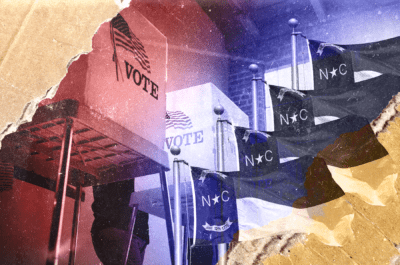


Governor
Updated polling shows a much less competitive governor’s race, with Democratic candidate Josh Stein currently leading by 21 percentage points.
However, 10% of voters said they were not yet decided.
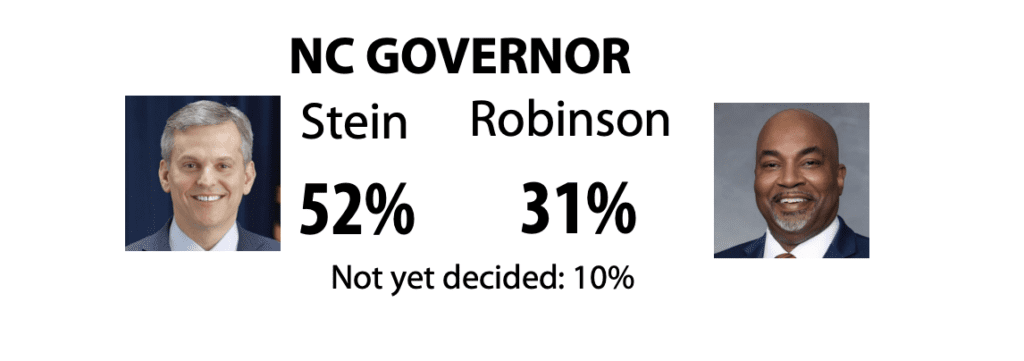
“Nearly half of voters (49%) said Stein would provide better leadership in North Carolina’s recovery from Helene while only 27% said Robinson would provide better storm recovery leadership,” the analysis says.
As lieutenant governor, Republican candidate Mark Robinson has increasingly been the subject of worldwide headlines.
According to the Elon poll, 72% of voters said they are aware of the latest news report by CNN, alleging offensive and sexually explicit posts by Robinson on a pornography site.
Of those voters aware of the allegations, only 23% said they believed Robinson’s denial of having made the posts.
“Some 8% of Republican voters said they have switched and will now vote for Stein because of the allegations,” the analysis says. “Overall, Robinson was viewed unfavorably by 55% of voters; that includes 82% of Democrats, 71% of Independents and 69% of Black voters.”
Public education is at the heart of the governor’s race, according to a recent article EdNC republished from The 74.
Superintendent of Public Instruction
In the state superintendent race, Democratic candidate Maurice “Mo” Green has an eight percentage point lead (43%) over Republican candidate Michele Morrow (35%).
However, 14% of voters were still undecided. An additional 9% said they had never heard of either candidate.
POLITICO recently listed the North Carolina superintendent race as one of three “way-down-ballot swing-state contests” to watch.
The GOP nominee in this race, Michelle Morrow, has called the public schools she would oversee “indoctrination centers.” She has also suggested that former President Barack Obama be executed by firing squad (at a rally in Charlotte over the weekend, Obama joked he is “self-interested” in the race).
Morrow is up against Mo Green, the superintendent of the third-largest school system in the state. He has called for increasing public school funding and raising teacher pay. North Carolina ranks 48th nationally in per-pupil funding.
This race is first a test of whether voters are unfazed by controversial comments and also the strength of the parental rights in education movement touted by Morrow that has taken hold in conservative circles across the nation.
POLITICO article
Enlace Latino recently published an article about Green’s educational priorities discussed during a Community Leaders Event in Durham. Morrow did not attend the event.
Read more
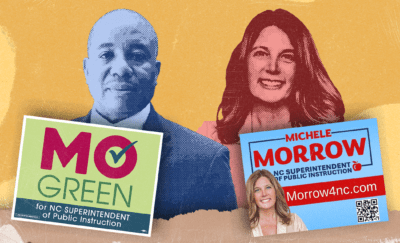
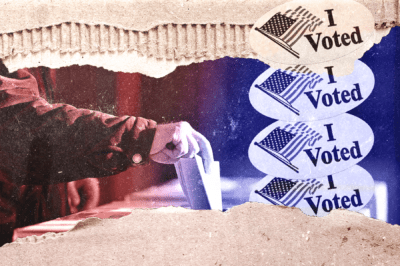
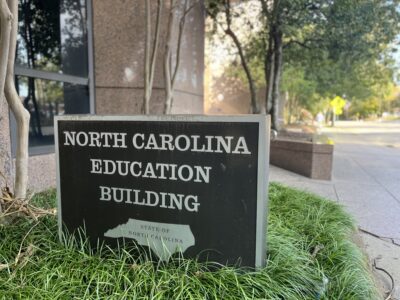
Lieutenant Governor
According to the Elon poll, Democratic candidate Rachel Hunt has a slight lead (41%) over Republican candidate Hal Weatherman (36%).
However, 21% of voters were still undecided, or had never heard of either candidate.
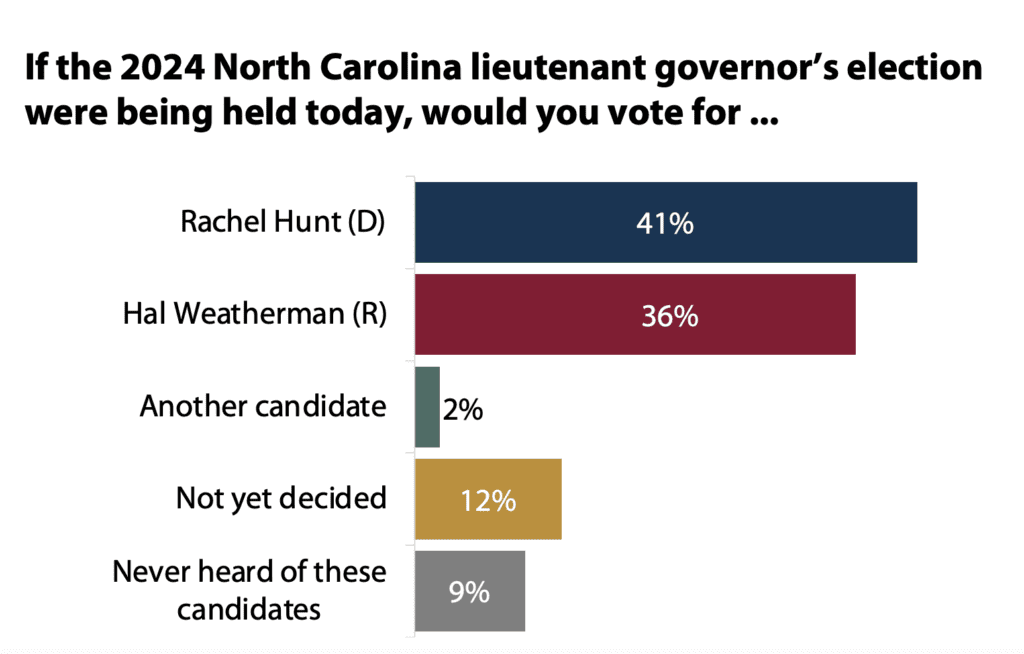
Attorney General
The poll also shows Democratic Attorney General candidate Jeff Jackson with a slight lead (43%) over Republican candidate Dan Bishop (38%).
Similar to the lieutenant governor’s race, nearly 20% of voters were still undecided on who to vote for, or had never heard of either candidate running for attorney general.

Recommended reading

